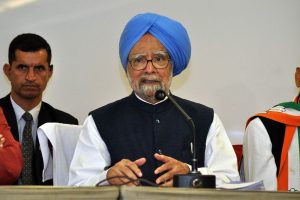Uncivilisation: The Dark Mountain Manifesto is Planet Earth’s cri de coeur against grotesque inequality and vandalization of nature. It was written by Paul Kingsnorth and Dougald Hine after two years of conversation and launched at a small riverside gathering outside Oxford in 2009. The Manifesto offers “a radical diagnosis of the situation in which our civilisation lives.” The election of Donald Trump and the blueprint of his administration’s agenda are scary.
Trump dismisses climate change as a “hoax.” He is undaunted by super hurricanes and floods and drought-fuelled wildfires that have devastated parts of the United States. The Project 2025 prepared by the ultra-conservative Heritage Foundation is widely believed to be the roadmap for the incoming Trump administration. It recommends a U-turn on energy and economic policy. Other suggestions include promoting oil and gas and not renewable energy and doing away with the goals of reducing emissions and green subsidies. Consequences of such suicidal policies are not hard to imagine. We are living in an extraordinary time when disparate crises are interacting.
Advertisement
Adam Tooze describes it as a “polycrisis.” It impacts most severely our Planet Earth and the indigenous people as it involves ethnocide, linguicide, epistemicide and cosmicide. We have blindly followed Western thought and ideas and ignored the indigenous thinking, knowledge systems and epistemologies. The Western model is extractivist, extinctivist and anthropocenic. It is a oneworld modernity. Capitalism and global free markets, Elon Musk boasts, will save the world. Johan Norberg of the libertarian think tank CATO Institute claims capitalism is “not just successful, but morally right.” In his book, The Capitalist Manifesto, he argues that social justice needs more capitalism, not less. “We need free market to end poverty.”
Experience tells us that there is a deep chasm between the promises of the new capitalism and the reality of social breakdown. Indigenous scholars have exposed the ugly face and uglier logic of brute capitalism. Footloose capitalism first puts a price on both natural resources and products, then commodifies, then securitises and then profits from speculative financial game. The likes of Musk and Peter Thiel are now eyeing outer space for making their trillions. Astrophysicist Neil Degrasse Tyson says that the first trillionaire will be made in space. Time has come for space environmentalism. The UN has convened a working group on the use of space resources. Karl Polanyi says that markets and states are inescapably intertwined and mutually constitutive.
Biologist and anthropologist Peter Turchin argues that the main interest of the new plutocracy of Silicon Valley is in maintaining all the zeroes attached to their outrageous fortune. The climate catastrophe is no ordinary crisis. As UN Secretary-General António Guterres has said, climate change is a “crisis multiplier” that has profound implications for international peace and stability. At such a moment, Gandhi is more important than ever before. Gandhi was the most radical dissenter of the 20th century. He taught humanity the power of ‘No’. In his scheme of things, no is a symbol of resistance. It implies a halt, a cessation and an insistence that enough is enough.
No is also the highest expression of dignity. When we say no, these moments can be the lighthouses that best guide our lives and our souls. Gandhi believed in the ‘economy of permanence.’ To him, mass production is only concerned with the product, whereas production by the masses is concerned with the product, the producers and the process. Gandhi believed that “those who don’t know when enough is enough will never have enough, but those who know when enough is enough already have enough.” Paul Kings north talks of a new political movement and a new political idea that is not socialism, not capitalism, but a politics of ‘one no, many yesses.’
When humanity is facing multiple crises, we need to say ‘no’ – no to GDP-centric growth, no to vandalization of nature and no to greedy capitalism. We are all confronting a growth mania which is the fatal disease of civilization. It must be replaced by what David C Korten calls “economy for the many” in which equity and well-being of society should be our goals, not consumption and more consumption. There is lot to learn from the lived experiences of the indigenous people and their epistemologies. Living in harmony with nature has been integral to their cultures, traditions and lifestyles. Their cultural practices, rituals, storytelling traditions and “everydayness of coping” are important lessons for us all.
The indigenous people hold the key to money-free happiness. They believe happiness happens only in a community. They have coped with uncertainties through storytelling. Stories shape who we are. They drive us to act out our own dreams and ambitions and mould our beliefs. It is an essential part of what makes us human. Stories are fundamental to cultures and societies. We have told stories for thousands of years. Stories can change the world. They are instruments of restorative justice. History itself is, at its core, the art of storytelling. For the indigenous people land and storytelling are intertwined. Land is also a source of Indigenous knowledge. So are land’s deep connection to language and their stories. It is time for climate action.
Books, both fiction and non-fiction, have a critical role in bringing about environmental behavioural change. University of Southampton professor Denise Baden in her recent article in Conversation Magazine refers to “thrutopian” fiction which is a new genre of literature. She asserts that books like No More Fairy Tales, Green Rising, The Ministry for the Future and Fairhaven contain “positive visions of what a sustainable society might look like if we do it right and shows how we can get there.”
Market fundamentalism has brought our Planet to a stage where one catastrophe, to quote Walter Benjamin, “keeps piling wreckage upon wreckage.” Israeli philosopher Yuval Noah Harari talks of a growing mismatch between our power and our knowledge. “It is much easier to build a dam over a river than to understand the full consequences for the fish, for the birds, for the trees, for the climate, for us.” Time has come when we must ask ourselves what have we done today for Planet Earth.
(The writer is director, Institute of Social Sciences, Delhi)











